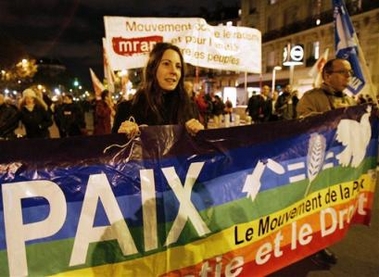|
France enjoys peace after weeks of turmoil
(AP)
Updated: 2005-11-18 10:57
French streets were relatively peaceful overnight after three weeks of
unrest, police said Thursday. But protest has erupted amid suggestions that
polygamy played a role in the violence.
Human rights groups are reacting with outrage to comments by French
officials who have said polygamy is one of the reasons youths from
underprivileged Muslim households have been rioting.
France's League of Human Rights called the comments "sickening and
irresponsible," while the anti-racist group MRAP said that such remarks would
only feed the "racism and exclusion" that incited youths to riot.
Over the past three weeks, the rioting spurred by widespread allegations of
racism and discrimination spread to nearly 300 towns and cities and involved
violent exchanges of stones and tear gas between youths and police.

A French student holds a banner reading
'Peace' in a protest against the government's request for a three-month
extension of a state of emergency, in Paris, Wednesday Nov. 16, 2005.
[AP] | Almost 3,000 youths — many of them
French-born children of North and West African immigrants — have been arrested.
At the peak 1,408 vehicles were burned in a single night. But police said the
number vehicles set ablaze late Wednesday and early Thursday fell to just 98,
the lowest tally yet.
Vandals have also hurled gasoline bombs at buildings, destroying or damaging
hundreds of shops, government offices, schools, and even mosques and a church.
Muslim leaders in France have condemned the attacks against houses of
worship, and said the violence against mosques showed that Muslims were not the
only ones behind the attacks.
Dalil Boubakeur, the director of the Great Mosque of Paris and one of the
country's leading Muslim figures, said in a statement Tuesday that it was too
easy to make Muslims "the scapegoat" of France's riots, and that he detected a
"troubling Islamophobia."
The unrest broke out on Oct. 27 in a housing project outside Paris after two
teenagers were accidentally electrocuted while hiding from police in a power
substation. It quickly spread through poor minority communities across France,
fed by anger over often shoddy housing, lack of employment and poor education.
The resulting violence sparked intense debate over France's failure to
integrate minorities and forced the government to confront problems of racism
and poverty.
That debate grew more strident after Labor Minister Gerard Larcher was quoted
in Wednesday's Financial Times as saying that youths from large polygamous
families often had social behavioral problems, stemming from lack of a father
figure.
At the same time, Interior Minister Nicolas Sarkozy was quoted in the current
issue of newsweekly L'Express as saying that polygamy is one of the cultural
differences that "makes it more difficult to integrate a French youth of African
origin with a French youth of another origin."
And Conservative lawmaker Bernard Accoyer told RTL radio that polygamy was
"certainly one of the causes" of the problems of integrating Muslim families
into French society.
The reaction was immediate. One group, the League of Human Rights, said in a
statement that the comments were provocative and "knowingly took the risk of
reinforcing xenophobia and racism."
Jean-Pierre Brard, a communist lawmaker from Seine-Saint-Denis, said he was
aware of 150 polygamous families in his town. But to link polygamy to the
rioting "is to treat people like imbeciles."
Polygamy is illegal in France. But visas were granted freely to family
members of immigrants until 1993, after which visas were authorized for only one
spouse. The Ministry of Social Affairs estimates on its Web site that there are
between 8,000 and 15,000 polygamous families in France.
|